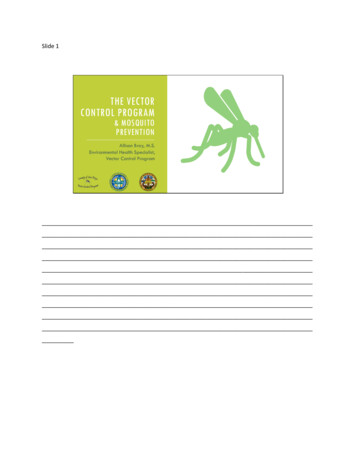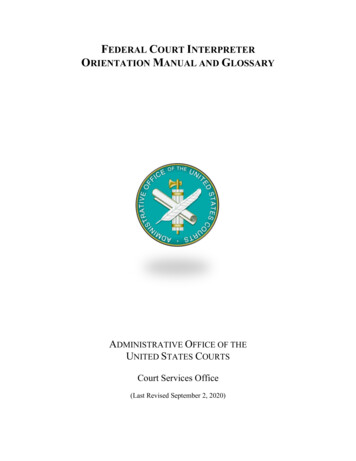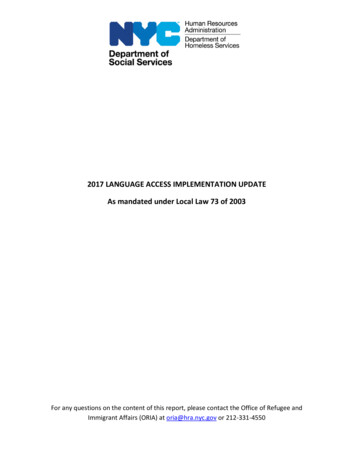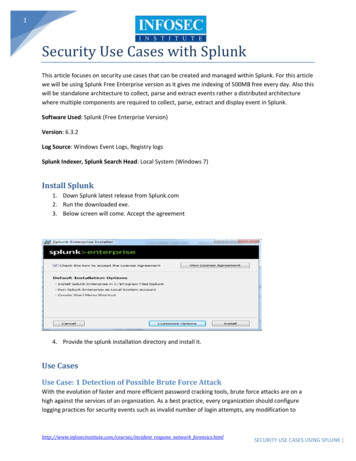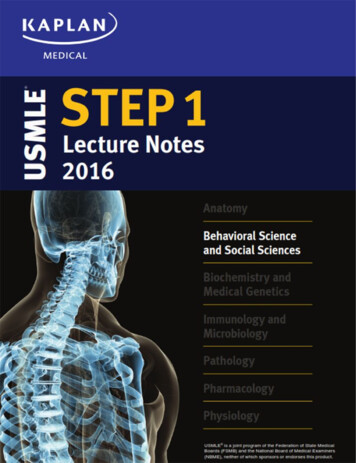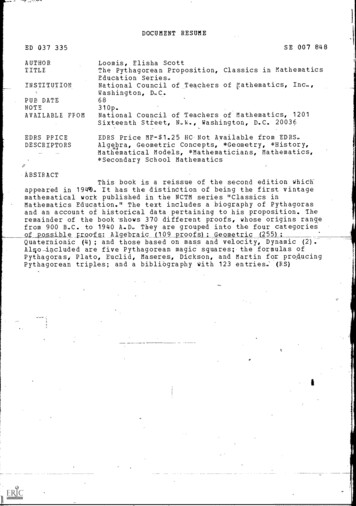
Transcription
JUDKINS v. HT WINDOW FASHIONS CORP.Doc. 288IN THE UNITED STATES DISTRICT COURTFOR THE WESTERN DISTRICT OF PENNSYLVANIAREN JUDKINS,Plaintiff,v.Civil Action No. 07 0251HT WINDOW FASHIONS CORP.,Defendant.MEMORANDUMGary L. Lancaster,Chief Judge.Thisentered ordersisJulyan action in patentruling on variousinfringement.post trialmotionsissuing a permanent injunction on March 31, 2010.court are three motions filed by HT seeking reI(1)orders:motionforstay,or2010WeandBefore thef from thosemodification,ofthepermanent injunction [doc. no. 273]i(2) motion to vacate thepermanent injunction [doc. no. 274]iand (3) motion to vacatefinding of literal ].For thethepermanentmodifyinjunction pending appeal pursuant to Federal Rule of CivilProcedure62 (c)toexcludetherecallofdouble celledproducts sold by HT on or prior to October 8, 2009.In allother respects the motions will be denied.A detailed summary of the factual, technical, andprocedural background of this case can be found in prioropinions of this court,and the Court of Appeals for theDockets.Justia.com
Federal Circuit, should the reader require such background.[doc. nos. 28, 55, 60, 109, 117, and 269] .I.Rule 62(c): Motion to Stay or ModifyPermanent InjunctionHTmoves,pursuantProcedure62 (c)permanentinjunctiontoFederalRuleoffor an order staying y,modifying the injunction pending appeal to exclude the recallprovision.Rule 62(c) permits a district court to "suspend,modify, restore, or grant" an injunction while an appeal ispending.Fed.R.Civ.P.62 (c) .For the reasonsthatfollow, we will deny the motion to stay enforcement of theinjunction,butinjunction difytheor beforeOctober 8, 2009.We will consider each form of relief requested byHT pursuant to Rule 62(c) separately below.A.Motion to Stay InjunctionIn determining whether to stay enforcement of apermanent injunction, we must consider the four factors setforth in Hilton v. Braunskill, 481 U.S. 770 (1987).factors are:These(1) a likelihood of success on the merits;(2)irreparable harm to HT absent a stay; (3) substantial injury2
toJudkinsinterest.FederalifId.astaywereat 776 77.Circuithasissued iand(4)thepublicThe Court of Appeals for thestatedthattheHiltonfactors"effectively merge" such that a court " . assesses movant'schances for success on appeal and weighs the equities as oducts, Inc. v. Gencor Industries, Inc., 897 F.2d 511, 513(Fed. Cir. 1990).Upon consideration of those factors, wefind that a stay of the injunction pending appeal is notwarranted in this case.HTcontendsthatithasastrongchanceofprevailing on appeal because the permanent injunction was notwarranted under eBay Inc. v. MercExchange, LLC, 547 U.S. 388(2006) and because the jury's verdict of literal infringementof the '120 Patent was not supported by sufficient evidence.[doc. no. 277 at pp. 10 13].However, other than stating itsdisagreement with the conclusions reached by the court andthe jury, HT has provided no support for its position.Wefind that, under the standards of review that will be appliedby the court of appeals, there is no basis on which to findthat HT has a particularly strong chance of succeeding onappeal on either of its arguments as to why this court shouldnot have issued a permanent injunction.3
We also find that an assessment of the iateenforcement of the injunction weighs against ordering a stay.According to HT,the permanent injunction should be stayedbecause its immediate enforcement will cause it irreparableharm in the form of lost sales of non infringing products,and erosion of its customer base.HT also claims that theinjunction should be stayed pending appeal because HunterDouglas has issued press releases misrepresenting the scopeof the injunction.However,HT has offered insufficientevidence in support of these allegations of ty to sell the infringing double celled products "willmost likely hurt HT's ability to sell single cell products aswell" and that "it is generally very difficult"to get apotential customer to buy products from HT if he forms arelationship with another supplier fall short of establishingirreparable harm to HT should the injunction be enforcedpending appeal.Other than making these generalized andconclusory predictions,Mr.Miles provides no evidence oflost sales to date of non infringing products or of lostpotential customers due to an inability to offer doublecelled products.Moreover, Mr. Miles fails to address thepossibility of offering a replacement double celled product,4
which appearsto be aasserted harms.supportHT'sirreparableviable option for alleviating theThe declaration, standing alone, does notclaimsthatharm wereitthewillsufferinjunction notimmediateandstayed pendingappeal.Hunter Douglas's press release likewise does merosiontoofitsitssalescustomerofnon-base.Although carefully crafted, the press release does not statethat the injunction applies to single celled products, norotherwise misrepresent its scope.HT has provided no otherevidence that Hunter Douglas, as Judkins's licensee, has beeninforming members of the industry that the injunction appliesto HT's single celled products.The fact that HT must educate its customer base orcementMoreover,asoftotheJudkinsappropriately points out, any harm to HT is as a result ofthe risks it bore by selling products adjudicated to infringeJudkins's patent.In comparison, were the injunction stayed pendingappeal, Judkins would suffer substantial injury.HT's allegations,Contrary tothe jury's verdict does not establish a5
royalty rate that should be applied to HT's post trial fringing product while the cross appeals are pending beforethe Court of Appeals for the Federal Circuit would causeJudkins to suffer financial harms because there is no royaltyrate to apply to future sales of the infringing product.Itwould also cause injury to Judkins's reputation and standingin the industry, as we have discussed previously.269 at pp. 7 9].theissue ofreiterationWe have already considered HT's position onharm to Judkins Iof[doc. no.itspositionandnowfind nothingthatwouldin HT'swarrantadeparture from our previous findings.FinallyIwe are not convinced by HT' s argument thatthe public interest would be harmed were the injunction notstayed pending appeal due to Hunter Douglas' s dominant marketposition and patent misuse.HT has offered no evidence tosupport its allegations, and regardless, HT never made suchallegations in this case against Judkins, nor sought to addany of his licensees as parties.We again find that thepublic interest favors enforcing the injunction against thecontinued sale of infringing products.In conclusion lstayingenforcementofthe Hilton factors weigh againstthepermanentappeal.6injunctionpending
B.Motion to Modify InjunctionIn the alternative,HT contends that the recallprovision should be excised from the permanent injunction, atleast for those products sold on or prior to October 8, 2009.Although not explicitly recognizing this distinction, HT isseeking relief pursuant to Rule 62(c), and, as such, can onlyobtain a modification to the recall provision pending appeal.[doc. no. 273 at p. 2; doc. no. 277 at pp. 6 7].HT weavesits modification request among its argument seeking a stay ofthe permanent injunction in its entirety, but the analysis isdifferent.for reliefUpon applying the Hilton factors to this requesttwe reach a different conclusion and find that itis appropriateto modify that portion ofthe permanentinjunction order that requires HT to recall product that wassold on or prior to October 8, 2009, pending appeal.otherrespects,therecallprovisionsoftheIn allpermanentinjunction entered on March 31 t 2010 shall remain unalteredand in effect pending appeal.As to the first Hilton factor, we find that HT hasa strong likelihood of succeeding on its appeal challengingthe requirement of recalling product sold prior to October 9,2009.The jury was instructed to award monetary damages, ifappropriate, for sales beginning on February 27, jury
accounted for sales up to and including October 8, 2009.Thejury awarded Judkins 154,776.04.HT now contends that the jury's verdict compensatedJudkins for all infringing sales occurring between February27, 2007 and October 8, 2009, and also established a royaltyrate of 8.75% for all future infringing sales.Therefore,according to HT, Judkins is not entitled to a recall of anyproducts sold by HT to date.Instead,according to HT,Judkins is entitled to payment of the jury's damages awardfor all sales occurring prior to October 9, 2009, and to anadditional award equal to 8.75% of any sales occurring afterthat date.WhileweconcludethatHThasalikelihood of succeeding on its argument thatreasonablethejury'sdamages award compensated Judkins for all sales occurringprior to October 9, 2009, making a recall order as to thoseproducts unwarranted, we do not conclude that HT is likely toprevail on its argument that the jury set a royalty rate of8.75% for all sales made by HT after that date.HT hasnow provided thecourtwith somelegalauthority in support of the general statement it made inopposition to Judkins's motion for a permanent injunctionthat ordering the recall of products for which the jury hasalready awarded damages would result in a double recovery.8
[compare doc. no. 232 at pp. 16 17 with doc. no. 277 at p.6J.In the single case now cited by HT, the Court of Appealsfor the Federal Circuit stated that "[hJaving been inginfringing thickeners, therefore, Amstar is not entitled toenj oin their use."Amstar Corp. v.Envirotech Corp.,823F.2d 1538, 1549 (Fed. Cir. 1987).The court has independently located cases in whichvarious courts have applied this general principle to avoiddouble recovery problems caused by awarding both damages andinjunctive relief as to the same infringing r.v.Abbott Laboratories,2008)(findingtheSee512 F.3dentryofaninjunction against future sales to be an abuse of discretionwhere reasonable royalties awarded by jury included " . anupfrontentryfee . basedProductsInt'l,2091996,*1Inc.v.uponfuturesales . " )Intex Recreation Corp.,(N.D. Ill. Sept. 16, 2004)iAero2004WL(" . any injunctionentered will not preclude the resale of infringing productsfor which Intex has already paid damages . ")iOdetics, Inc.v. Storage Technology Corp., 14 F.Supp.2d 785, 788 89 (E.D.Va. 1998) ("Once the jury required STK to pay damages for thesale of these thirty systems, there arose an implied licenseas to them.")icompare Transamerica Life Ins. Co. v. Lincoln9
Nat. Life Ins. Co., 625 F.Supp.2d 702,717 18 (N.D. Ia. etoproducts that infringe an apparatus claim from products thatcontinue to infringe,through continued practice, a methodclaim), reversed on other grounds, Lincoln Nat. Life Ins. Co.v. Transamerica Life Ins.Co.,2010 WL 2509909(Fed.Cir.Jun. 23, 2 010) .This authority provides HT with afairly stronglikelihood that it will succeed on appeal in challenging thiscourt's permanent injunction to the extent it requires HT torecall product that was sold prior to October 9, 2009 becausethe jury awarded damages for these sales reasonablelikelihood of success in challenging the recall provisions ofthis court's permanent injunction as applied to product soldby HT after October 8, 2009 because the jury did not awarddamages for those sales, nor set a royalty rate for futuresales.Thisauthority also doesnotprovideHT with areasonable likelihood of success in challenging this court'sorder requiring the recall of marketing materials and samplebooks.Our conclusion regarding the likelihood of successfactor informs our consideration offactors.the remaining HiltonHT would suffer irreparable harm pending appeal if10
required to recall the products sold prior to October 9, 2009for which it is already obligated to pay damages.Judkinswould suffer no injury in not obtaining an immediate recallofproductsdamages.forwhichthejury hasalready awarded himFinally, the public interest weighs in favor of notawarding double recovery to patent owners.However,pending appealOctober 8,ifHTwouldnotsufferirreparablerequired to recall productharmsold after2009, and related marketing and sales materialspending appeali infringements for which HT has not alreadycompensated Judkins.Regardless,any harm that HT wouldsuffer in this instance would be a result of HT's decisionto take a high risk in continuing to sell potentially, andthen, actually,infringing products.Judkins would sufferfinancial and reputational injuries, as previously discussed,if he were unable to obtain a recall of those products forwhich the jury has not already awarded damages.Finally, thepublic interest weighs in favor of protecting patent ownersfrom furtherinfringements,for which they have not beenpreviously compensated.In conclusion,wefind that the Hilton factorsweigh in favor of granting HT's request that we modify theinjunction pending appeal to remove the requirement that HT11
recall product it sold prior to October 9, 2009. 1However,HT must still recall those products sold after October 8,2009,and all sales and marketing materials in accordancewith the March 31 st permanentinjunction order,and thiscourt's April 26 th order granting an extension of time.[doc.no. 279].HT shall direct its customers,sales staff,anddistributors to segregate product purchased from it prior toOctober 9,2009 and storeit in an appropriatelocationpending appeal of this matter before the Court of Appeals forthe Federal Circuit.HT shall direct its customers, salesstaff, and distributors to return to it all product sold tothem by HT after October 8,2009.If the customer, salesagent, or distributor is unable to determine when it obtainedparticular product from HT, HT shall direct them to presumethatthe product was acquired after October 8,return to it to HT.staff,2009HT shall direct its customers,andsalesand distributors to return all brochures, catalogues,price books, samples, and other materials in accordance withthe March 31, 2010 permanent injunction order.In order to obtain this modification, HT must eitherpay the 154,776.04 judgment, or seek relief pursuantto Federal Rule of Civil Procedure 62(d). Should HTchose to do neither, our modification of the injunctionpending appeal shall be ineffective.12
II.Rule 60{b): Motions to VacateHT also moves, pursuant to Federal Rule of injunction on the ground that Judkins cannot obtain equitablerelief because he comes to court with unclean hands and onthe ground that the jury's verdict of literal infringementwas not supported by sufficient evidence.We find that HTis not entitled to relief on either basis.As an initial matter, although neither party raisesthe issue, we must address the current procedural posture ofthese motions in light of the fact that both HT and Judkinshave filed notices of appeal.The court entered its orderdisposing of post trial motions and entering ainjunction on March 31,2010.permanentHT filed motionsseekingrelief under Federal Rule of Civil Procedure 60 on April 23,2010.HT then filed its notice of appeal five days later onApril 28, 2010.11,2010.Judkins filed his notice of appeal on MayUnderFederalRulesofAppellateProcedure4(a) (4) (A) (vi) and 4(a) (4) (B) (i) these notices of appeal maynot yet be effective. 2If the notices of appeal are not yeteffective, then this court has jurisdiction to rule on thepending Rule 60(b) motions.2However, we note that the appeals have been docketed atthe Court of Appeals for the Federal Circuit, and adeadline for HT's "blue brief" has been set.13
If, however, the notices of appeal are effective,then thiscourtcan only denytheRule60 (b)motions.Typically the filing of a notice of appeal automaticallytransfersjurisdictionappellate court.fromtheMain Line Fed.Tri Kell, Inc., 721 F.2d 904,Sweet,758 F.2d 117, 120906districtSavs.&courttotheLoan Assoc.v.(3d Cir. 1983) i Venen v.(3d Cir. 1985).However,in thecase of a motion filed under Rule 60(b), the district courtretains jurisdiction to consider and deny, but not grant, themotion.Fed.R.Civ.P.62.1(a) (2)UnitediStatesv.Contents of Accounts Numbers 3034504504 and 144 07143 atMerrill Lynch, Pierce, Fenner and Smith, Inc., 971 F.2d 974,988 (3d Cir. 1992)(quoting Main Line))iVenen, 758 F.2d at123; Sea Star Line, LLC v. Emerald Equipment Leasing, Inc.,2009 WL 3805569, *4 (D. Del. Nov. 12, 2009); see Ginsburg v.Birenbaum, 2008 WL 2073975 at *1 2 & n.32008)(collecting cases).(W.D. Pa. May 14,Because we find no basis on whichwe would grant HT the relief it requests, we can consider anddeny both motions."The general purpose of Rule 60, which provides forrelief from judgments for various reasons,properbalancebetweentheconflictingis to strike aprinciplesthatlitigation must be brought to an end and that justice mustbe done."Boughner v. Sec'y of Health, Educ. & Welfare, 57214
F.2d 976, 977 (3d Cir. 1978).The Court of Appeals for theThird Circuit "view[s] Rule 60(b) motions as 'extraordinaryreliefwhichshould begranted only wherejustifying circumstances are present. 'F.2d 919, 930 (3d Cir. 1991)ffextraordinaryBohus v. Beloff, 950(quoting Plisco v. Union R.R.Co., 379 F.2d IS, 16 (3d Cir. 1967))see also Boughner, 572iF.2d at 977 ("[R]elief from a judgment under Rule 60 shouldbe granted only in exceptional circumstancesffThus, \\ [t] he).movant under Rule 60 (b) bears a heavy burden .F.2dat930(internalquotationsmarksBohus, 950ffandcitationsomitted) .Here, HT seeks to vacate the court's entry of apermanent injunction because Judkins had unclean hands andto vacate the jury's finding of literal infringement becauseit was not supported by sufficient evidence.thelatterargumentin post trialaddress it in detail again.thejuryinstructions,motionsWe addressedandneedPutting aside any analysis ofourclaimconstructionitselfaccounted for the single sheet of material limitation.wefound in post trial motions,evidenceonwhichtonotbasetheitsAsjury had sufficientfindingofliteralinfringement.As for the former argument, HT did not oppose entryof the injunction on the ground that Judkins had unclean15
hands, and to that extent has waived the argument.To theextent HT bases its unclean hands argument on statements madeby this court in its March 31, 2010 opinion, nothing thereinholds that Judkins is ineligible for equitable relief.Thisis evidenced by the fact that, in that opinion, we ctandgranted Judkins equitable relief.In conclusion,courtwouldgrantHTthere is no basis on which thisanyreliefunderRule60 (b),andtherefore we deny the motions, regardless of any questionssurrounding our authority to grant them due to the pendingappeals.Fed. R. Civ. P. 62.1(a) (2).III. ConclusionFor the foregoing reasons, we grant HT's requestthatwemodifytheinjunction pendingOctober 9, ermanentpriortoIn all other respects we deny HT's motions.appropriateordercontemporaneously with this opinion.16willbeentered
IN THE UNITED STATES DISTRICT COURTFOR THE WESTERN DISTRICT OF PENNSYLVANIAREN JUDKINS,Plaintiff,v.Civil Action No.00 0251HT WINDOW FASHIONS CORP.,Defendant.AND NOW,this1-セORDERday of July,2010,ITIS HEREBYthePermanentORDERED as follows:HT'sMotiontoStayorModifyInjunction Pending Appeal [doc. no. 273] is GRANTED, in slyherewith;HT's Motion to Vacate Permanent Injunction [doc.no. 274] is DENIED; andHT'sMotiontoVacateInfringement [doc. no. 275) is DENIED.cc: All Counsel of RecordFindingofLiteral
HT WINDOW FASHIONS CORP. Doc. 288 Dockets.Justia.com. Federal Circuit, should the reader require such background. [doc. nos. 28, 55, 60, 109, 117, and 269] . . HT contends that it has a strong chance of prevailing on appeal because the permanent injunction was not .
